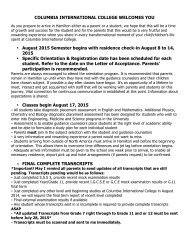french
You also want an ePaper? Increase the reach of your titles
YUMPU automatically turns print PDFs into web optimized ePapers that Google loves.
Numbers seventy to seventy-nine are configured in the form of soixante-[10-19]. For example<br />
seventy is soixante-dix (60-10), seventy-three is soixante-treize (60-13), and seventy-seven is<br />
soixante-dix-sept (60-10-7).<br />
Number eighty is configured in the form of quatre-vingts (4 - 20's) || catr vahn || eighty<br />
Numbers eighty-one to ninty-nine are configured in the form of quatre-vingt-[01-19]. For<br />
example eighty-one is quatre-vingt-un (4*20-one), ninty is quatre-vingt-dix (4*20-10), and<br />
ninty-four is quatre-vingt-quatorze(4*20-14).<br />
une dizaine (one ten)<br />
une douzaine (one dozen)<br />
cent 100 une centaine (one hundred)<br />
[deux - neuf] cents 200-900<br />
mille 1.000 un millier (one thousand)<br />
(un) million 1.000.000<br />
(un) milliard 1.000.000.000<br />
For 70-79, it builds upon "soixante" but past that it builds upon a combination of terms for 80-99<br />
Only the first (21,31,41,51,etc) have "et un"; but past this it is simply both words consecutively<br />
(vingt-six, trente-trois, etc)<br />
For 100-199, it looks much like this list already save that "cent" is added before the rest of the<br />
number; this continues up to 1000 and onward.<br />
L'heure<br />
Time.<br />
French Vocabulary • Print version • audio (upload)<br />
The Time L'heure<br />
# French Pron. English<br />
01 l'heure (f) ? time, (one) hour, o'clock<br />
02 une demi-heure ? half-hour (half an hour)<br />
03 le matin ? morning<br />
05 le midi ? noon<br />
06 l'après-midi (m) ? afternoon<br />
07 le soir ? night<br />
08 le minuit ? midnight<br />
09 la journée ? daytime<br />
Use heure in between the hour and the minutes when telling the time, e.g., Il est cinq heures dix<br />
Note that there is no "a.m." or "p.m." in French. Use du matin, de l'après midi, and du soir to<br />
disambiguate a given time. "Il est sept heures du soir" makes it clear that it is 7 o'clock at night, and<br />
not in the morning. Alternatively, you could use the 24-hour system: "Il est dix-neuf heures" has no<br />
ambiguity; time is often expressed in this fashion, particularly in professional/commercial settings.<br />
Midi and minuit can be used without an article when telling the time: "Il est midi." (It is noon.)




